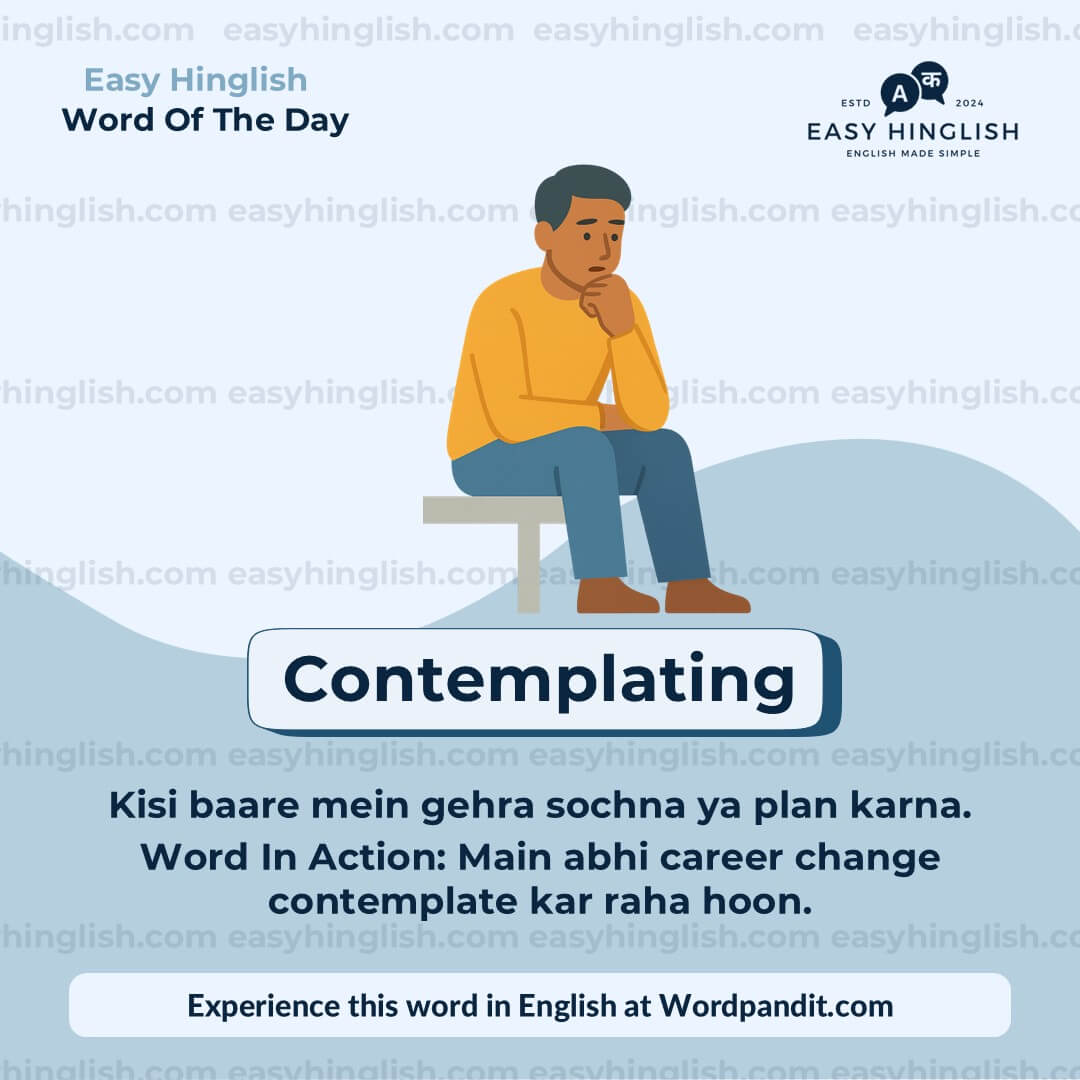Daily Vocabulary International Newspapers aur Publications se Seekho
Wordpandit ke Global Vocabulary Hub ke Saath Apni Vocabulary Expand Karo
Wordpandit par, hum aapko ek truly global vocabulary develop karne me madad karte hain, jo duniya ke sabse respected international publications se li gayi hoti hai. Yeh section aapko naye words se introduce karne ke liye design kiya gaya hai jo global conversations aur trends ko define karte hain.
Global Sources ka Power
Aapko globally sochne aur communicate karne me madad dene ke liye, hum vocabulary curate karte hain world ke top international sources se, jaise:
- The New York Times
- The Washington Post
- BBC
- The Guardian
- The Economist
- Scientific American
- Psychology Today
- Aur bhi bahut saare...
Globally Socho, Competitively Seekho
Hamare daily updates se aap international publications ke naye words seekhoge jo global news aur developments se jude hote hain. Isse aapki vocabulary current bhi rahegi aur globally relevant bhi.
Apni Global Soch Ko Expand Karo
Agar aap international exams ki tayari kar rahe ho, global business communication me excel karna chahte ho, ya sirf apni language skills improve karna chahte ho, toh Wordpandit aapko global level pe grow karne ke liye best resources provide karta hai.
Smart Learning, Global Reach
Hamari learning methodology me global examples, memory aids, aur interactive activities shamil hain, jo naye words ko effectively yaad karne aur real-world me use karne me madad karti hain.
Aaj Hi Apni Global Vocabulary Journey Shuru Karo!
Wordpandit Kyun Choose Karein?
Practical Learning: Aise words seekho jo real-world reading aur communication me aapko sach me kaam aayenge, taaki aapki comprehension aur bolne ki skills improve ho.
Diverse Content: Current affairs se lekar scientific breakthroughs tak, hamare different sources aapko multiple domains ki vocabulary seekhne ka moka dete hain.
Effortless Integration: Wordpandit ko apni daily routine ka part banao. Sirf kuch minute har din dene se aapki vocabulary time ke saath kaafi improve ho sakti hai.
Vocabulary Mastery Tak Ka Aapka Safar
- Regularly hamare Daily Vocabulary section ko visit karo
- Naye words explore karo aur unka context me use samjho
- In words ko apni writing aur bolne ki practice me use karne ki koshish karo
- Jaise-jaise aapke words badhte hain, apni progress ko track karo
Aaj Hi Apni Vocabulary Journey Shuru Karo!
Wordpandit ke saath vocabulary improve karna start karo. Roz thoda effort dalne se aap ek strong vocabulary develop kar sakte ho jo academic, professional, aur personal life me kaafi kaam aayegi.
Yaad rakho, ek naya shabd roz seekhna linguistic limitations ko door karne ka best tareeka hai! Wordpandit ko apni daily learning journey ka sathi banao aur vocabulary excellence ki taraf badho!
WORD-1: Globalization
Sandarbh (Context):
"Before World War I, globalization was at a high point. Advances in technology, including the steamship and the telegraph, allowed people, goods and news to cross borders with extraordinary speed. Migration boomed. The economist John Maynard Keynes, conjuring an Edwardian version of Amazon, recalled how “the inhabitant of London could order by telephone, sipping his morning tea in bed, the various products of the whole earth, in such quantity as he might see fit, and reasonably expect their early delivery upon his doorstep.”" - The New York Times
Vyakhya (Explanatory Paragraph):
Globalization ka matlab hai duniya ke countries aur logon ka ek doosre se zyada connected hona. Ye trade, communication, travel, migration aur technology ke through hota hai. Simple shabdon mein, globalization duniya ko chhota banata hai, jisme ideas, goods, services aur cultures easily borders ke across move karte hain. Ye growth aur cultural exchange ka chance deta hai, lekin inequality aur identity loss jaise debates bhi create karta hai.
Arth (Meaning): Duniya ke countries aur cultures ka interconnected aur ek doosre par dependent hona (Noun)
Uccharan (Pronunciation): glo-buh-lai-zay-shun
Kathinai Star (Difficulty Level): ⭐⭐⭐ Madhyam (Intermediate)
Utpatti (Etymology): "Global" (worldwide) + "-ization" (ek prakriya). Ye term 20th century ke mid mein popular hua jab international trade aur cultural exchange fast hua.
Prashant Sir Ke Tathya (Prashant Sir's Notes):
Globalization ko "shrinking distances" ki tarah socho. Jitni fast technology, travel aur communication hoti hai, utna hi zyada log connected hote hain. Ye sirf trade ke liye nahi, balki cultural exchange, ideas aur climate change jaise global challenges ke liye bhi important hai.
Samanarthi & Vipritarthi (Synonyms & Antonyms):
Samanarthi (Synonyms): internationalization, interconnectedness, worldwide integration, universalization
Vipritarthi (Antonyms): isolationism, nationalism, protectionism, fragmentation
Udaharan (Usage Examples):
- Globalization ki wajah se chhote businesses bhi international customers tak pahunch rahe hain.
- Kai log kehte hain ki globalization se rich aur poor countries ke beech ka gap aur badh jaata hai.
- Aaj ki food culture globalization ka sabse bada example hai—Mumbai mein pizza aur Paris mein sushi milta hai.
- Digital communication ne globalization ko aur speed de di hai.
Sanskritik Sandarbh (Cultural Reference):
"Globalization sirf peace aur unity nahi laata, balki competition aur conflicts bhi spread karta hai." - Contemporary debates on international relations
Sochiye (Think About It):
Kya globalization sach mein logon ko kareeb laata hai, ya phir yeh local cultures aur traditions ko khatam kar deta hai?
Chhoti Kriya (Quick Activity):
Apne daily use ki teen cheezein likho (jaise food, clothes, ya gadgets) aur pata karo ki woh kin countries se aayi hongi. Sochiye yeh globalization aapke life mein kaise dikhta hai.
Yaad Karne Ka Tarika (Memory Tip):
Socho “Global” + “-ization” = duniya ek badi village ban rahi hai. “Global Village” phrase yaad rakho taaki globalization easily yaad rahe.
Vastavik Jeevan Me Upyog (Real-World Application):
Globalization ka asar jobs, culture, travel aur environment policies par hota hai. Example ke liye, ek smartphone design ek country mein hota hai, manufacture doosri country mein aur worldwide bech diya jata hai—yeh globalization ka best real example hai.
WORD-2: Migration
Sandarbh (Context):
"Before World War I, globalization was at a high point. Advances in technology, including the steamship and the telegraph, allowed people, goods and news to cross borders with extraordinary speed. Migration boomed. The economist John Maynard Keynes, conjuring an Edwardian version of Amazon, recalled how “the inhabitant of London could order by telephone, sipping his morning tea in bed, the various products of the whole earth, in such quantity as he might see fit, and reasonably expect their early delivery upon his doorstep.”" - The New York Times
Vyakhya (Explanatory Paragraph):
Migration ka matlab hai logon ka ek jagah se doosri jagah move karna—kabhi same desh ke andar, kabhi doosre desh tak—taaki wahan temporarily ya permanently settle ho sakein. Log jobs, education, safety, family, ya climate jaise reasons se migrate karte hain. Yeh process history bhar mein cultures, languages aur skills ko mix karta aaya hai; lekin kabhi-kabhi isse cultural clashes, shehron mein bheed-bhaad, ya home country mein brain drain jaise issues bhi hote hain.
Arth (Meaning): Logon ka rehne/kaam karne ke liye ek jagah se doosri jagah jaana, khaaskar borders cross karke (Noun)
Uccharan (Pronunciation): mai-GRAY-shun
Kathinai Star (Difficulty Level): ⭐⭐ Basic–Intermediate
Utpatti (Etymology): Latin migratio se aaya, jiska matlab hai “residence change/ek jagah se doosri jagah jana,” aur yeh verb migrare (“move/ghoomna-phirna”) se bana. Simple mein: migrare → migratio → migration.
Prashant Sir Ke Tathya (Prashant Sir's Notes):
Migration sirf physical movement nahi, change ka process hai. Jaise pakshiyon ki seasonal flight unki survival ke liye zaroori hoti hai, waise hi humans ka migrate karna bhi opportunities, safety aur growth ke liye natural raha hai. Mindset: “movement = adaptation.”
Samanarthi & Vipritarthi (Synonyms & Antonyms):
Samanarthi (Synonyms): relocation, movement, resettlement, diaspora, exodus
Vipritarthi (Antonyms): settlement, residence, permanence, immobility
Udaharan (Usage Examples):
- Industrial Revolution ke time rural logon ka massive migration cities ki taraf hua.
- Agriculture aur construction sectors mein seasonal migration kaafi common hai.
- Bird migration nature ka sabse fascinating pattern maana jaata hai.
- Conflicts aur climate change ki wajah se recent years mein global migration rate badha hai.
Sanskritik Sandarbh (Cultural Reference):
"We are all migrants through time." – Mohsin Hamid, Exit West (adapted)
Sochiye (Think About It):
Agar migration human history ka natural hissa hai, to kya modern borders ko global challenges ke context mein rethink karna chahiye?
Chhoti Kriya (Quick Activity):
Apni family history sochiye: kya aapke purvaj kisi aur sheher/rajya/desh se yahan aaye the? Ek sentence likhiye ki us migration ne aaj aapki life ko kaise shape kiya.
Yaad Karne Ka Tarika (Memory Tip):
Mnemonic: “MiGRation = Go & Resettle.” Birds ko aasman mein “V” shape mein udte sochiye—jahaan birds migrate karte hain, waise hi log lands cross karte hain.
Vastavik Jeevan Me Upyog (Real-World Application):
Refugees ka safety ke liye nikalna, skilled professionals ka jobs ke liye relocate hona, students ka abroad padhna—yeh sab migration ke real examples hain. Is concept ko samajhne se policy, economy, aur social harmony par balanced nazariya banta hai.
WORD-3: Inhabitant
Sandarbh (Context):
"Before World War I, globalization was at a high point. Advances in technology, including the steamship and the telegraph, allowed people, goods and news to cross borders with extraordinary speed. Migration boomed. The economist John Maynard Keynes, conjuring an Edwardian version of Amazon, recalled how “the inhabitant of London could order by telephone, sipping his morning tea in bed, the various products of the whole earth, in such quantity as he might see fit, and reasonably expect their early delivery upon his doorstep.”" - The New York Times
Vyakhya (Explanatory Paragraph):
Inhabitant ka matlab hota hai koi vyakti ya jeev jo kisi khaas jagah rehta hai. Ye shabd residence ya belonging ko highlight karta hai—matlab sirf guzarne wala mehmaan nahi, balki wahan ka rehne wala. Inhabitant humans bhi ho sakte hain aur animals bhi—jaise jungle ke inhabitants mein birds, deer, aur insects shamil hote hain.
Arth (Meaning): Koi vyakti/jaanuvar jo kisi jagah par lagatar rehta ho (Noun)
Uccharan (Pronunciation): in-HAB-i-tuhnt
Kathinai Star (Difficulty Level): ⭐⭐ Basic
Utpatti (Etymology): Latin inhabitare se—in- (“andar”) + habitare (“rehna, basna”). Middle English (14th century) se English mein istemal ho raha hai.
Prashant Sir Ke Tathya (Prashant Sir's Notes):
Inhabitant ko seedha yaad rakho: “jo jagah ko apna ghar banata hai.” Har shehar, gaon ya mohalla apne inhabitants se hi zinda lagta hai—unki boli, reeti-riwaaz aur routine us jagah ki pehchaan banate hain.
Samanarthi & Vipritarthi (Synonyms & Antonyms):
Samanarthi (Synonyms): resident, dweller, occupant, settler, native
Vipritarthi (Antonyms): visitor, outsider, tourist, stranger
Udaharan (Usage Examples):
- Island ke inhabitants apni rozi-roti ke liye mainly fishing par depend karte hain.
- Puraane khandaars humein city ke former inhabitants ki life ke baare mein batate hain.
- Gaon ka har inhabitant tyohar ke din chowk mein ikattha hota hai.
- Polar bears Arctic regions ke natural inhabitants maane jaate hain.
Sanskritik Sandarbh (Cultural Reference):
"Shehar sirf buildings ka jhund nahi; uske inhabitants hi usme jaan daalte hain." – urban studies reflections (adapted)
Sochiye (Think About It):
Jahan hum rehte hain, wahan ke inhabitants ke taur par hum par environment ko protect aur preserve karne ki kaunsi zimmedariyan aati hain?
Chhoti Kriya (Quick Activity):
Apne shehar/gaon ka sochiye: teen aisi cheezein likhiye jo yahan ke inhabitants ko kisi doosri jagah ke logon se alag banati hain (jaise local language, food habits, festivals).
Yaad Karne Ka Tarika (Memory Tip):
Break it: “Inhabit” (to live in) + “-ant” (one who). Toh inhabitant = one who lives in. Dimag mein ghar ka icon banao—jo ghar in-habit karta hai, woh inhabitant hai.
Vastavik Jeevan Me Upyog (Real-World Application):
Geography/sociology mein population ko “number of inhabitants” ke roop mein measure kiya jaata hai. Ecology mein “forest ke inhabitants” bolkar species ka zikr hota hai. Daily news/official reports mein bhi “city inhabitants” phrase common hai.
WORD-4: Contemplating
Sandarbh (Context):
"America in the year 1945 and America in 2025 have many parallels that are worth contemplating today. Like today, that America faced a rare epic juncture in the nation’s history and even in world history." - Big Think
Vyakhya (Explanatory Paragraph):
Contemplating ka matlab hai kisi baat ko gehraai se aur dhyaan se sochna. Ye sirf ek chhoti si soch nahi hoti, balki thoda ruk kar carefully uske results, meaning ya possibilities ko samajhne ki koshish hoti hai. Log life ke bade decisions, past events, ya philosophical sawalon par contemplation karte hain taaki clarity mile.
Arth (Meaning): Kisi cheez ke baare mein gahraai se aur dhyaan se sochna (Verb)
Uccharan (Pronunciation): kon-tem-PLAY-ting
Kathinai Star (Difficulty Level): ⭐⭐⭐ Madhyam (Intermediate)
Utpatti (Etymology): Latin contemplari se, jiska matlab hai “dhyaan se dekhna/observe karna,” com- (“poori tarah”) + templum (“observation ki jagah, temple”). Pehle iska use sacred places mein meditative observation ke sense mein hota tha.
Prashant Sir Ke Tathya (Prashant Sir's Notes):
Contemplating ko “thinking with depth” samajhiye. Jaise shanti se baith kar kisi problem ya idea ko baar-baar apne mind mein replay karna, taaki clarity aaye. Ye reflection ke bare mein hai, action jaldi lene ke bare mein nahi.
Samanarthi & Vipritarthi (Synonyms & Antonyms):
Samanarthi (Synonyms): pondering, reflecting, considering, meditating, mulling over
Vipritarthi (Antonyms): ignoring, overlooking, dismissing, neglecting
Udaharan (Usage Examples):
- Woh khidki ke paas baithi apne life ke decisions ko contemplating kar rahi thi.
- Committee education system mein bade reforms contemplating kar rahi hai.
- Risks ko contemplate karne ke baad usne project mein invest na karne ka decision liya.
- Nature ko contemplate karna mind ko shanti aur clarity deta hai.
Sanskritik Sandarbh (Cultural Reference):
"The unexamined life is not worth living." – Socrates (yeh quote hamesha contemplation ki importance ko highlight karta hai)
Sochiye (Think About It):
Aaj ke fast-paced digital world mein kya hum contemplation ke liye time nikalte hain, ya distractions ne deep thinking ko replace kar diya hai?
Chhoti Kriya (Quick Activity):
Apne ek bade decision ko sochiye jo aapne recently liya. Do reasons likhiye ki aapne woh path kyon choose kiya. Ab 5 minute shanti se contemplate kijiye ki agar dobara chance mile to aap wahi decision lenge ya nahi.
Yaad Karne Ka Tarika (Memory Tip):
Sochiye shabd “temple” jo “contemplate” mein chhupa hai. Jaise temple mein log shanti se reflection ke liye jaate hain, waise hi contemplation ka matlab hai deep soch.
Vastavik Jeevan Me Upyog (Real-World Application):
Contemplating decision-making, leadership aur personal growth ke liye zaroori hai. Leaders bade steps lene se pehle contemplate karte hain, students apne career paths ko contemplate karte hain, aur societies past events ko contemplate karke better future banati hain.
WORD-5: Epic
Sandarbh (Context):
"America in the year 1945 and America in 2025 have many parallels that are worth contemplating today. Like today, that America faced a rare epic juncture in the nation’s history and even in world history." - Big Think
Vyakhya (Explanatory Paragraph):
Epic shabd ka asli matlab tha ek lambi kavita ya kahani jo heroic deeds ko describe karti thi—jaise Homer ki Iliad ya Odyssey. Dheere-dheere iska sense broaden ho gaya aur ab iska use kisi bhi cheez ke liye hota hai jo grand, extraordinary ya “larger than life” ho. Aaj kal hum casual bol-chaal mein bhi “epic” ka use karte hain, jaise “epic win” ya “epic fail,” jiska matlab hota hai kuch bahut hi impressive ya unforgettable.
Arth (Meaning): Ek lambi heroic poem/story; ya koi cheez jo bahut hi grand, extraordinary ya memorable ho (Noun/Adjective)
Uccharan (Pronunciation): EH-pik
Kathinai Star (Difficulty Level): ⭐⭐ Basic–Intermediate
Utpatti (Etymology): Greek epos (“kahani, poem”) se, Latin epicus ke through English mein aaya. 18th century tak iska matlab sirf kavita tha, lekin baad mein iska use kisi bhi monumental ya heroic cheez ke liye hone laga.
Prashant Sir Ke Tathya (Prashant Sir's Notes):
Epic ko simple mein samajho: “larger than life.” Koi poem ho, movie ho ya historical event—agar woh unforgettable aur monumental feel hota hai, toh use “epic” bol sakte ho.
Samanarthi & Vipritarthi (Synonyms & Antonyms):
Samanarthi (Synonyms): monumental, legendary, heroic, grand, colossal
Vipritarthi (Antonyms): trivial, ordinary, insignificant, minor
Udaharan (Usage Examples):
- Iliad aur Mahabharata duniya ki sabse badi epics maani jaati hain.
- Yeh battle freedom ke liye ek epic struggle ke roop mein yaad rakha gaya.
- Movie ke special effects aur scale ne use sach mein epic bana diya.
- Mount Everest climb karna ek epic achievement maana jaata hai.
Sanskritik Sandarbh (Cultural Reference):
Aaj ki pop culture mein “epic” slang ban gaya hai—jaise “epic fail” (bahut badi galti) ya “epic win” (bahut badi jeet).
Sochiye (Think About It):
Kya hum aaj “epic” shabd ka itna use karte hain ki iska asli grandeur aur depth khatam ho gayi hai?
Chhoti Kriya (Quick Activity):
Ek historical event aur ek personal life ka moment likhiye jo aapko lagta hai “epic” hai. Bataiye kyon aap use epic samajhte ho.
Yaad Karne Ka Tarika (Memory Tip):
Sochiye “epic movies” jaise Lord of the Rings—grand, heroic aur unforgettable. Bas wahi epic ka asli matlab hai.
Vastavik Jeevan Me Upyog (Real-World Application):
“Epic” ka use literature, films, history aur daily conversations mein hota hai. Chahe woh ek maha-kavya ho, ek blockbuster movie ho, ya ek extraordinary achievement—epic hamesha “ordinary se bada aur yaadgar” signal karta hai.













